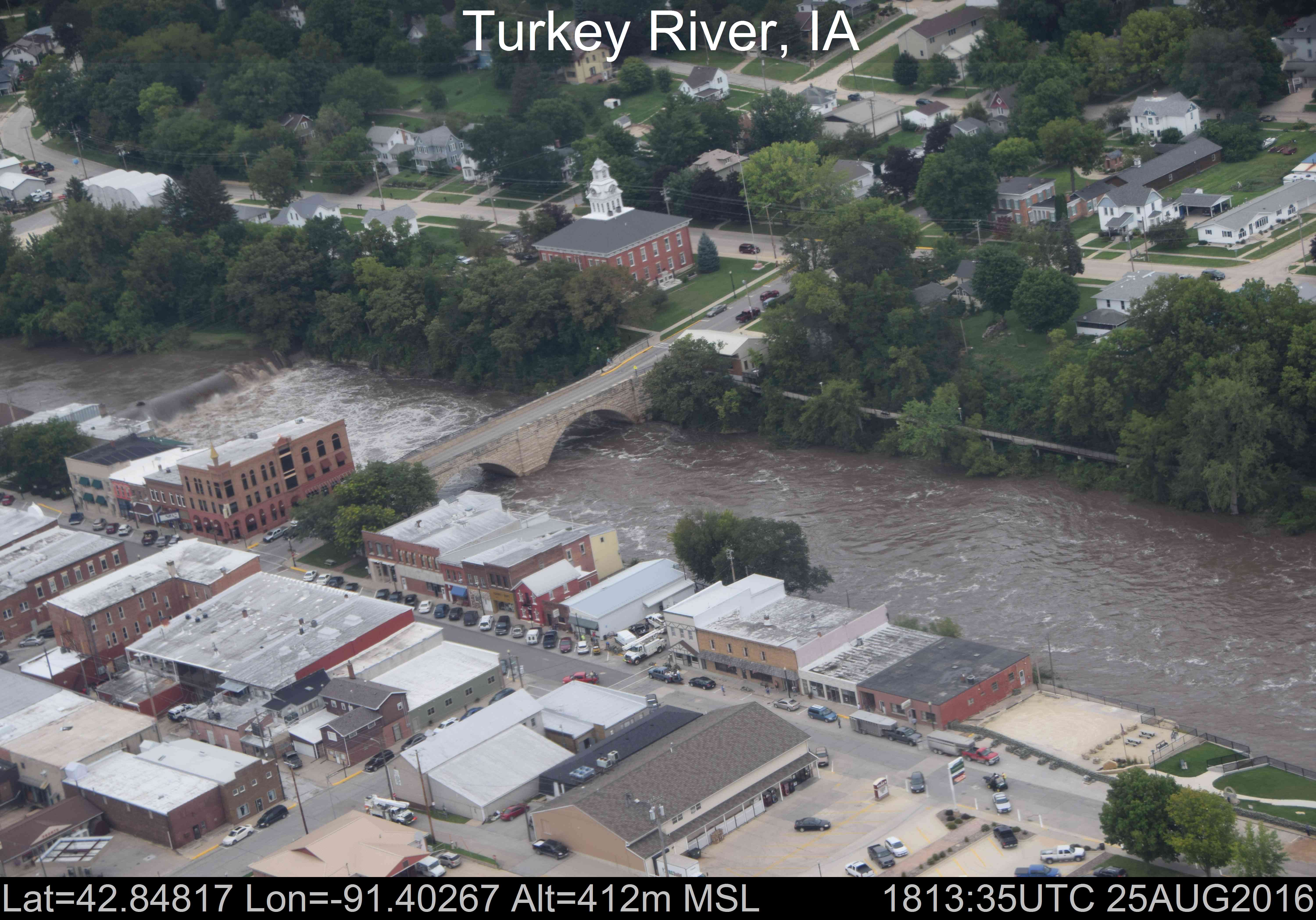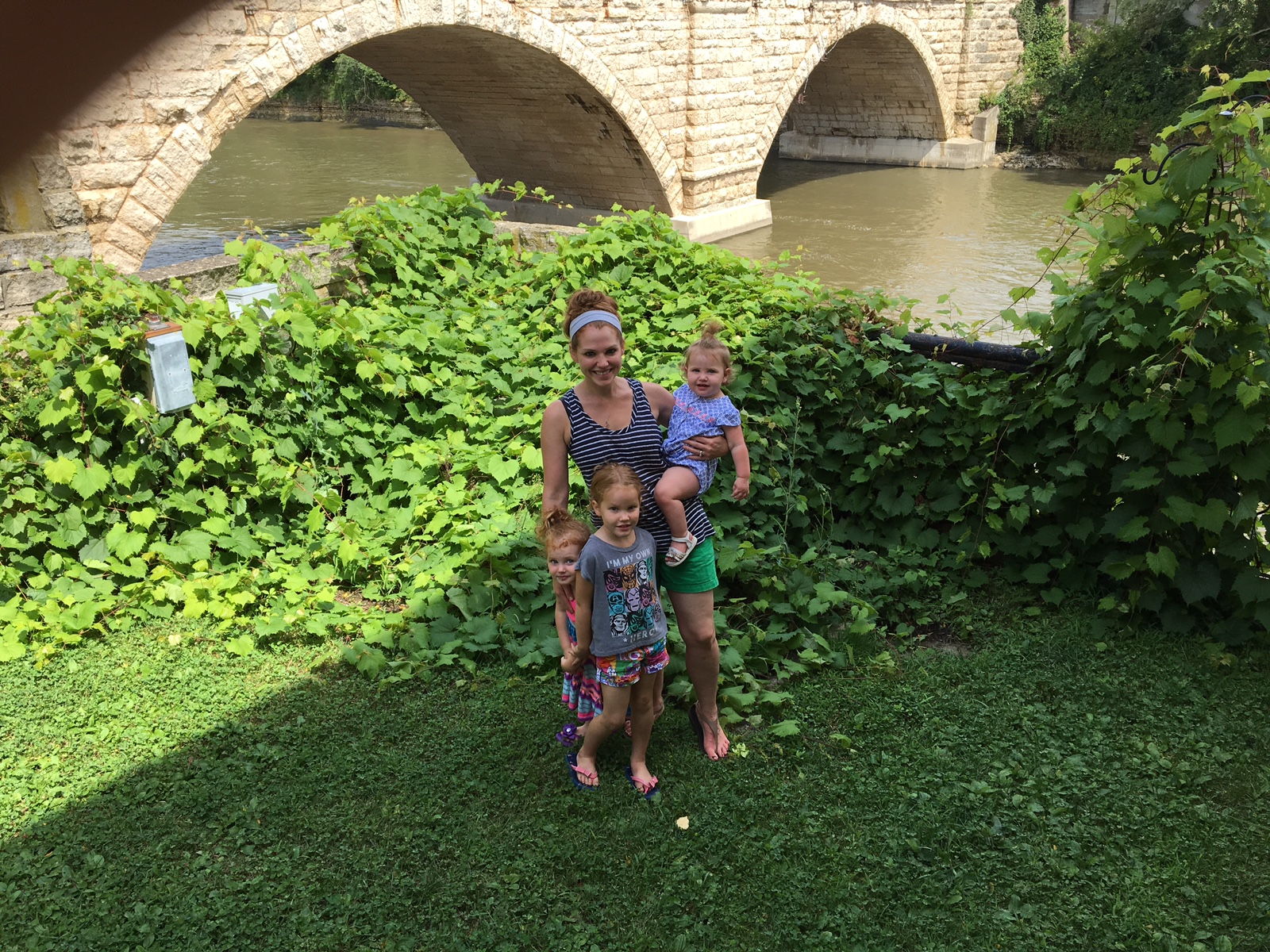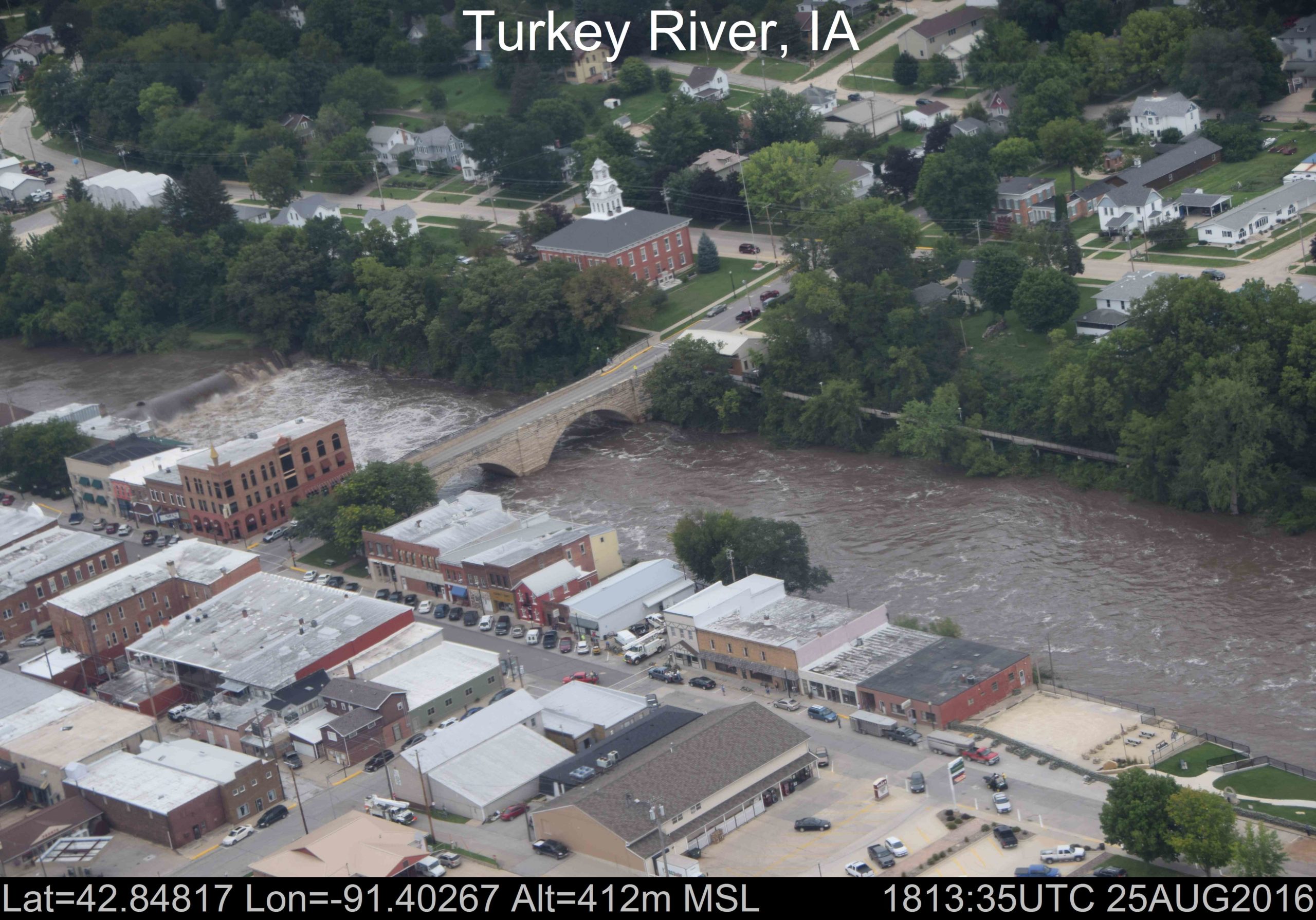Over September 9-13, our new ISU PhD student Tania Leung and I traveled to northwest Iowa to the Lakeside Laboratory. Our goals at Lakeside were twofold: to collect preliminary data on our Iowa Water Center funded project in order to plan our field campaign for summer 2017, and
to participate in the Phycological Research Consortium (PRC).
Introducing a New Member to the Iowa Water Center Team
Hanna Bates joined the Iowa Water Center at the end of August as the Program Assistant. In this position, she will administer our grants program, assist in planning our education and outreach events, and assist in facilitating the relationship between water-related researchers and the public.
Continue readingWhen it comes to water…
From Melissa Miller, Iowa Water Center Associate Director
What a difference a week makes. Last Friday, my family and I made a lunch and relaxation stop in Elkader on our way to Wisconsin for a weekend getaway. My girls love water, so we walked over the Keystone Bridge for a good look.

Hana, 3, and May, 5 pose near the Turkey River in Elkader on 8/19/16.
Just a week later, Elkader and other Northeast Iowa residents are dealing with severe flooding from torrential downpours earlier in the week that dumped as much as 8″ of rain in some areas, causing damage to homes, businesses, and even killing one person swept away in the flash floods. Some residents had to evacuate their homes and take shelter elsewhere (including fish!). The water that makes these communities peaceful, beautiful places to live and visit can also pose severe challenges.

Flooding of the Turkey River in downtown Elkader as taken by NOAA’s National Operational Hydrologic Remote Sensing Center’s Airborne Snow Survey airplanes.
This storm is a solemn reminder of the power of water and the importance of studying it. Our seed grant RFP will be released soon, and this year we are partnering with other Water Resources Research Institutes in the Mississippi and Ohio River Basins to share knowledge so that we’re advancing our understanding together. In addition, the Iowa Watershed Approach has already begun work in communities to help address flood and water quality risks and increase community resiliency to events like the ones this week. Related to flooding, up-to-date flood information is available through the Iowa Flood Information System (IFIS).
IWC’s overarching goal is to improve management of water resources. “Management” might not be the best term, because in many cases, water (and nature) does what it will. There’s a parallel between “managing” water and “managing” children – no matter what you want out of it, the true nature of the water (and the child) will always rise up.

One of many attempts at a “nice” family picture at the Keystone Bridge. Getting kids to look at the camera with serene smiles can be as difficult as telling a river or a rain cloud exactly where to run or when to empty.
We’ve got news…
It’s been a little quiet around this old blog-that tends to happen in the aftermath of the Iowa Water Conference. A challenge we’ve always faced is limited staff – you’ll notice there are only two faces on our About Us page.
That’s about to change. Today, our posting for a program assistant went live on iastatejobs.com. As public interest in Iowa’s water management has heated up, so has the role we’re able to play in shaping Iowa’s water future. The Iowa Watershed Approach grant from the U.S. Department of Housing and Urban Development and increasing expansion of the Daily Erosion Project have put us in a place where we not only need more staff, we have the support to do so.
So what will the program assistant do? Lots of important stuff. Does that sum it up? Okay, to be more specific, this person will:
- administer our competitive grants program
- help with planning education and outreach events (including the Iowa Water Conference)
- keep track of the approximately 10 million details involved in managing IWC sponsored projects
- spread the word about all the fantastic water research and activities going on
We’re looking for a know-it-all. A details person. A deadline embracer. A communicator.
The posting is currently open through June 5. If you or someone you know are interested in this position, please review the job posting and submit through the Iowa State system. Want to talk it through? Call or email. We’re ready.
Waxing poetic about working together (and NIWR)
In the water world, we talk a lot about working together. We all live in a watershed. The importance of partnerships. Work with your upstream neighbor to improve life downstream.
Sometimes, all it is, is talk. We say we want to work together, but it doesn’t happen, for whatever reason – maybe we can’t get together, we get busy with other things, we can’t agree on priorities. But the reason we talk about working together in water is because we do all live in a watershed. Working with your upstream neighbor DOES improve life downstream. Partnerships aren’t only important, they’re vital to success, and when we work together, impactful things happen.
Last week, 49 of the 54 Water Resources Research Institutes got together for the annual director’s meeting. The Virginia Water Resources Research Center planned the meeting this year (we had the honor last year) and for three days, we worked together.
A few droplets that represent the bigger “working together” stream:
-49 out of 54 WRRIs were in attendance. The meeting was in Washington, DC. The Virgin Islands made it. Alaska made it. Even Guam made it. (Actually, Guam director Shahram Khosrowpanah is a valued member of the NIWR board.) Distance didn’t preclude the Institutes from getting together.
-We heard from federal representatives that told us water resources research is headed toward the funding of collaborative, interdisciplinary research – multifaceted projects that address water resources not just from a technical perspective but also from a human dimension perspective. Water resources management IS the proverbial Big Picture. Research will treat it as such.
-Over a period of 24 hours, the Iowa, Illinois, and Tennessee Institutes went from chatting over a few sandwiches about potentially working on a regional effort to planning, identifying, and putting into action a plan to work with USGS Water Science Centers in our state and region to focus on making a difference in the Mississippi River basin. (More on that as it develops.) All three states have different priorities and run their Institutes a little differently, but we all have one goal.
This meeting was, and always is, a short period of time in which we focus on what it means to work together. Iowans, you have an opportunity to do the same thing next month at the Iowa Water Conference. Use the conference to not only learn about the latest in water management in Iowa, but to find people and organizations with whom you can work together. Work with your upstream neighbor; you WILL improve downstream. Partnerships ARE important. And for goodness sake, we all live in a watershed!
FUNDING OPPORTUNITY: IWC’s 104(b) competition
At long last, the Iowa Water Center has released the request for proposals for the 2016 104(b) seed grant competition. Proposals are due November 16, 2015. This year, there are two programs for which to apply:
Seed Grant Water Research Competition
Funding of up to $30,000 for one year is available for researchers at one of Iowa’s accredited public or private universities or community colleges. Multiple year projects will be considered for the seed grant water research competition, but continued funding for subsequent years is subject to the availability of funds and progress made in the first year. The proposal must indicate what results/products can be achieved in each individual project year. Subsequent year funding is not guaranteed. Researchers seeking second-year funding must resubmit their proposal showing a new budget and progress made.
Priority will be given to projects that show potential for attracting additional grant money from state, federal, and other sources to support the research program. If funded, two short but required reports must be completed during the project year as a USGS requirement. The Iowa Water Center will also request a fact sheet from your work and a contribution to the Iowa Water Conference in the form of a poster or presentation.
In subsequent years, the Iowa Water Center will contact investigators to survey future impacts resulting from the seed grant funding, including “follow-on funding” and partnerships made as a result of grant activities.
The Iowa Water Center anticipates funding one seed grant in 2016.
Graduate Student Supplemental Research Competition
Funding of up to $5,000 for one year is available to graduate students nearing completion of their program of study. This program is designed to allow students to complete additional research objectives or products beyond the scope of their current water related funded project. The proposed budget must also include funds for publication costs; students will be encouraged to submit their research to peer-reviewed publications. Iowa Water Center staff will be available to help facilitate such submissions.
The Iowa Water Center anticipates funding two graduate student supplemental grants in 2016.
Priority Area for 2016: nutrients
This year’s focus will be on nutrients and their impact on Iowa’s waters and water management decisions. Excess nutrients in Iowa’s waters contribute to significant water quality issues, both locally and downstream. Public awareness of nutrient-related water quality issues is rising along with pressure on legislative bodies to address nutrient management issues through regulation.
Nutrients in water is a broad topic that may encompass any of the following areas related to excess nutrients in surface and ground water:
- land use implications
- tile drainage management
- sedimentation and phosphorus loss
- eutrophication
- water quality monitoring
If you have any questions about this program, please contact Melissa Miller.
FUNDING ANNOUNCEMENT: USACE-IWR/NIWR Water Resources Competitive Grants Program
One of the three grant opportunities the Iowa Water Center (IWC) facilitates submissions for each year is Water Resources Competitive Grants Program, sponsored by the US Army Corps of Engineer Institute for Water Resources (IWR). This year’s proposal deadline is a month earlier than last year – July 17, 2015. Here’s a few things you need to know about this program:
1) IWR works with Water Resources Research Institutes like IWC to help manage the submission process. What does that mean? Researchers are encouraged to work with their state institute director while developing their proposal. They must submit their proposal to the WRRI, who will review it before passing it along to IWR. This process allows for more coordinated water resources research in the state.
2) Funds are pretty limited and competitive for this opportunity: typically only 1-2 projects are awarded with a max budget of $200,000. The good news: no matching funds are required.
3) This opportunity is for applied investigative proposals. There are three objectives – collaboration between IWR and university scientists, dissemination and application of information, and training of scientists, engineer and policy makers in water resources. Priority areas vary from year to year – the FY2015 call has eight.
4) The funded project in FY2014 went to *drum roll, please* the University of Iowa, for the highly collaborative “Prototype Multi-Jurisdictional Decision Making Web Platform for Integrated Water Resources Management: From Interagency Collaboration to Implementation in the Iowa-Cedar Watershed.” Marian Muste with IIHR-Hydroscience & Engineering is the lead investigator.
For more information, please read the FY 2015 RFP – it’s fairly short and worth your while to peruse it to see if you know of a project that would be a good fit.
Finally, the most important note – if you plan to apply this year, you MUST contact the Iowa Water Center as soon as possible to let us know so we can be prepared to review and submit your project!
ANNOUNCEMENT: Oklahoma State University Student Water Conference now accepting abstracts
On March 26-27, 2015, Oklahoma State University will host its Student Water Conference in Stillwater, OK, and they’re looking for students to submit their abstracts in water research.
From the website:
“About the Conference: The conference will consist entirely of student presentations to be judged by a panel of faculty members for providing constructive feedback to students in regard to their research presentation skills. Awards will be given for outstanding student presentations. Also, student activities will promote interaction among students of all disciplines.”
A note from Dr. Garey Fox, interim director of the Oklahoma Water Resources Center, mentions that there are travel assistantship funds up to $500 for participating students. They’re hoping to have students from all across the country.
This conference comes at a great time for students looking to present their research in a contest format – the Iowa Water Conference is just a few short weeks before and features a student poster contest as well as a non-judged format with 15-minute oral research presentations. The Iowa Water Conference would be a great warm up for those students looking to compete at the Oklahoma event!
